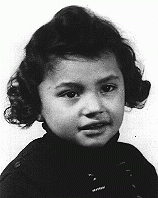
Inge Auerbacher
Born: December 31, 1934
Kippenheim, Germany
Inge was the only child of Berthold and Regina Auerbacher, religious Jews living in Kippenheim, a village in southwestern Germany near the Black Forest. Her father was a textile merchant. The family lived in a large house with 17 rooms and had servants to help with the housework.
1933-39: On November 10, 1938, hoodlums threw rocks and broke all the windows of Inge's home. That same day police arrested her father and grandfather. Inge, her mother and grandmother managed to hide in a shed until it was quiet. When they came out, the town's Jewish men had been taken to the Dachau concentration camp. Her father and grandfather were allowed to return home a few weeks later, but that May her grandfather died of a heart attack.
1940-45: When Inge was 7, she was deported with her parents to the Theresienstadt ghetto in Czechoslovakia. When they arrived, everything was taken from them, except for the clothes they wore and Inge's doll, Marlene. Conditions in the camp were harsh. Potatoes were as valuable as diamonds. Inge was hungry, scared and sick most of the time. For her eighth birthday, her parents gave her a tiny potato cake with a hint of sugar; for her ninth birthday, an outfit sewn from rags for her doll; and for her tenth birthday, a poem written by her mother.
On May 8, 1945, Inge and her parents were liberated from the Theresienstadt ghetto where they had spent nearly three years. They immigrated to the United States in May 1946.